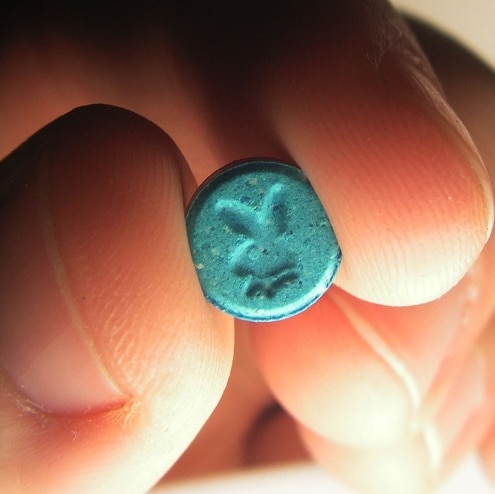MDMA pills , or 3,4-methylenedioxymethamphetamine, is a synthetic drug that acts as a stimulant and hallucinogen. At the molecular level, MDMA is structurally similar to both methamphetamine and mescaline, giving it unique properties that affect the brain in profound ways. When ingested, MDMA quickly enters the bloodstream and crosses the blood-brain barrier, enabling it to interact directly with neurons. The primary action of MDMA is on three key neurotransmitters: serotonin, dopamine, and norepinephrine. These chemicals are crucial for regulating mood, pleasure, and energy levels.
The most significant impact of MDMA is on the serotonin system. MDMA causes a massive release of serotonin from storage sites in neurons, leading to a surge in serotonin levels in the brain. This flood of serotonin contributes to the feelings of euphoria, emotional warmth, and enhanced sensory perception that users experience. Additionally, MDMA inhibits the reuptake of serotonin, prolonging its effects and intensifying the overall experience. Dopamine and norepinephrine also play roles, with dopamine contributing to the drug’s reinforcing properties and norepinephrine increasing heart rate and energy levels. MDMA Pills
Beyond these primary effects, MDMA interacts with other brain systems, including the oxytocin and vasopressin pathways. Oxytocin, often referred to as the “love hormone,” is associated with social bonding and trust. MDMA’s ability to increase oxytocin levels is thought to enhance feelings of empathy and connection with others. Vasopressin, similarly, is involved in social behaviors and hydration regulation. Together, these interactions create the complex and multifaceted experience that MDMA users report, a mix of physical, emotional, and perceptual changes that define the essence of ecstasy.
The future of MDMA research is bright, with emerging studies promising to deepen our understanding of its effects and therapeutic potential. One of the most exciting areas of research is the exploration of MDMA-assisted therapy for PTSD. With promising results from initial studies, larger clinical trials are underway to further validate the efficacy of this treatment. Researchers are also investigating the mechanisms by which MDMA enhances emotional processing, aiming to optimize therapeutic protocols and improve outcomes.
Beyond PTSD, MDMA is being studied for its potential to treat other mental health conditions. For example, research is exploring its use in addressing social anxiety in autistic adults, where the empathogenic effects of MDMA can facilitate social interactions and reduce anxiety. Studies are also examining MDMA’s potential for treating depression, particularly in cases where traditional treatments have been ineffective. These diverse applications highlight the versatility of MDMA as a therapeutic agent. MDMA Pills
Advancements in neuroimaging techniques are also contributing to MDMA research. By using tools like functional magnetic resonance imaging (fMRI), researchers can observe the brain’s activity during MDMA use, providing insights into how the drug affects neural circuits and emotional processing. These findings can inform the development of targeted therapies and enhance our understanding of MDMA’s impact on the brain. As research continues to unfold, the future of MDMA holds promise for both scientific discovery and therapeutic innovation.
The Legal Status of MDMA: Current Regulations and Laws, The legal status of MDMA varies widely across the globe, reflecting differing perspectives on its risks and potential benefits. In the United States, MDMA is classified as a Schedule I controlled substance under the Controlled Substances Act. This classification indicates a high potential for abuse, no accepted medical use, and significant safety concerns. As a result, the production, distribution, and possession of MDMA are illegal, with severe penalties for violations. However, research into MDMA-assisted therapy is permitted under strict regulatory oversight, allowing scientists to explore its therapeutic potential. odin pharma
In contrast, some countries have adopted more lenient approaches to MDMA regulation. For example, in the Netherlands, MDMA is illegal for recreational use but is tolerated in certain contexts, such as at festivals and clubs, where harm reduction measures are emphasized. Similarly, Switzerland allows limited use of MDMA in clinical trials, recognizing its potential benefits for mental health treatment. These differing legal frameworks reflect a balance between addressing the risks of MDMA and exploring its therapeutic applications. MDMA Pills
The evolving legal status of MDMA also highlights the role of advocacy and public opinion in shaping drug policy. Organizations like MAPS have been instrumental in promoting research and raising awareness about the potential benefits of MDMA-assisted therapy. Their efforts have contributed to changes in regulatory attitudes, including the FDA’s designation of MDMA-assisted therapy as a Breakthrough Therapy. As research continues to demonstrate the therapeutic potential of MDMA, it’s possible that legal frameworks will adapt to accommodate its use in clinical settings. buy weed online usa





